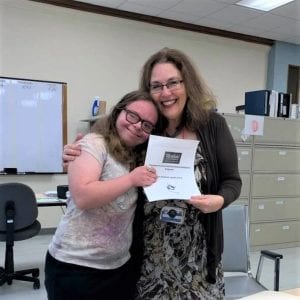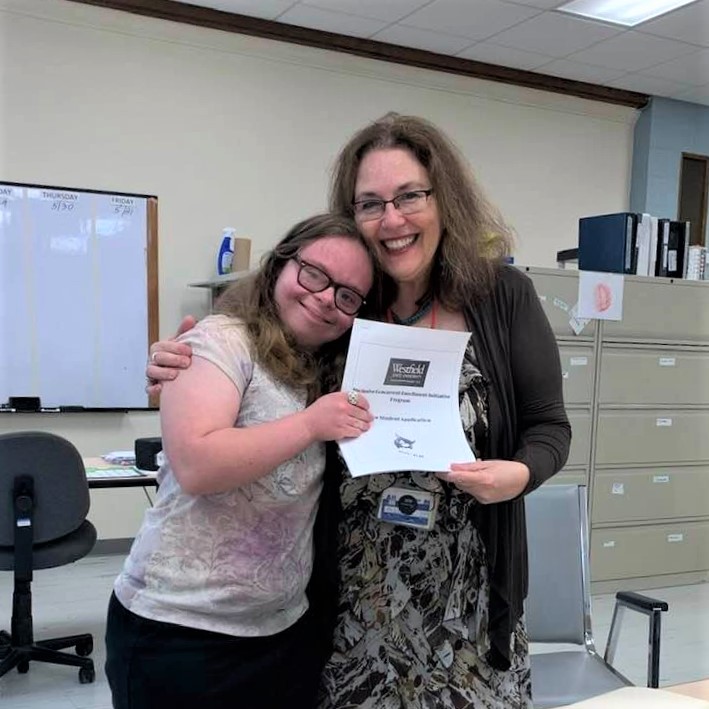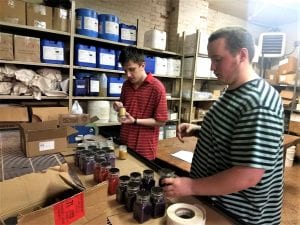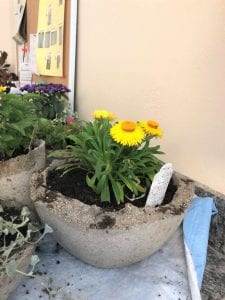
Maddie Gainer hugs Sherry Elander after learning that she has been accepted into the MAICEI program. (Photo submitted)
WESTIELD – This week, the Massachusetts Department of Higher Education announced an almost $100,000 grant to Westfield State University for the Inclusive Concurrent Enrollment Initiative (ICEI), which supports students aged 18 to 21 with learning-disabilities to take dual enrollment courses at the University.
Among the 23 students who will be attending courses at WSU through this program are four students from the East Mountain Transition program in Westfield.
“The East Mountain Transition program is one of our longest and strongest,” said Lyndsey Nunes, the WSU MAICEI program coordinator.
Strong is a fitting word to describe the East Mountain Transition Program run by Sherry Elander, transition specialist with the Westfield Public Schools. The program is entering its sixth year in a building on the grounds of Western Mass Hospital, and its thirteenth year in the district.
This year, the program will have 24 students, ages 18 to 21 enrolled. Thirteen are returning students, and 11 are new to the program. On average, 10 students a year are moving up, Elander said. Half of the students are on the autism spectrum.
Besides the four students who will be attending WSU, another four will be attending the MICEI program at Holyoke Community College.
Elander said up until last year, the ICEI program was free at WSU. She said their numbers had to decrease due to cost. She also said she works hard to make sure that her program does not cost the district a lot of money.
“Also, word was getting out more, and other districts wanted to be a partner in the program because they were more aware of it and families were more aware of it,” she said. This year, 11 school districts are participating in the WSU ICEI program.
Nunes said the ICEI program is working towards self-sustainability at the university in order to ensure that the program remains part of the infrastructure. She said she is grateful for the state grant as they work towards that goal.
“We’re pretty fortunate. The administration is so supportive, the staff and faculty is invested, and most important, the student body,” Nunes said. She said the program hopes to become self-sustaining this year through tuition payments by sending districts.
“When we’re looking at slots that cost money, any student going to ICEI has to be a part of the IEP team decision and has to be in the IEP. The student has to have a vision of going to college. We have limited slots,” Elander said, adding that of the four going to WSU, two are new, and two are returning.
Due to the increased cost of the ICEI program last year, Elander started collaborating with Tara Bean, who runs the college and career program in the high schools, for other options for her students at local colleges.
“This year, in addition to my eight ICEI students, we are supporting three students who we have gotten enrolled in the dual enrollment program that all students have access to, at no cost to the district or to families,” Elander said. Another student who is still a senior at Westfield High School will also be enrolled. The students won’t get the same supports from the university, but will be supported by the district.
“I’m really excited that we’re trying something new out. We’re trying to expand opportunities for my students,” she said.
She explained that ICEI takes students with intellectual disabilities and is not for students who will be able to matriculate. Students in ICEI haven’t passed MCAS and graduated, or have prepared an MCAS alternate portfolio.
Some East Mountain students are able to matriculate. Currently Elander has seven students working on passing one or two courses in preparation for the MCAS.
“All of the students we’ve worked with over the last six years have all gotten their diplomas,” she said, which she said is about 10 out of 10. “So far, (there is a) 100% pass rate for students I worked with.”

Garrett Wheeler oversees East Mountain students making garden planters for the Planting it Forward program. (Photo submitted)
Besides college opportunities, the East Mountain program is also very involved in connecting students with careers.
“I don’t think everyone needs to go to college,” Elander said, nor do they want to.
Over the years, the program has built strong partnerships with the YMCA, Rinnova Creative Arts, Central Baptist Church, Responsible Driving School, Pilgrim Candle, Westfield City Hall, Westfield Public Schools, the ReStore, WSU (she has student from ICEI working at the university), and Shaker Farms Country Club.
New partnerships have been formed with Blue Umbrella Bookstore, which is starting a weekly book club, and the Ohana School of Performing Arts in Chicopee, started by Ashley Kohl.
East Mountain also has a long-time partnership with Shaker Bowl in East Longmeadow through the Center for Human Development, and the Gandara Impact Youth Center in Springfield, a peer mentoring group for 16-21 year olds. Elander said the collaboration with the Impact Center offers a variety of different programming classes and opportunities.
The Mass Developmental Disabilities Council also offers two 10-week series at Independence College at HCC. The series is taught by an individual with disabilities and has a focus on employment and self-advocacy skills. Elander said training coordinator Lee Larriu oversees the whole program, and trains people with disabilities as trainers.
Elander also has a meeting set with Doug Cotton, owner of Whip City Music.
“I have a student who went through this program, spent one year at ICEI, and matriculated into college at HCC,” she said.
He recently reached out to Elander and wants to volunteer. She got him an internship with Whip City Music, and she hopes to help him be able to teach music one day.
“Guitar is his thing,” she said.
Garrett Wheeler, another student who graduated from the program last October, recently chose to come back as a volunteer. Elander explained that they do all of their own maintenance and don’t have money for a janitor in their budget. She wanted to find a way to compensate him for his work.
Elander applied for a mini-grant from the Westfield Education Foundation and put in a stipend for him. For the grant, Wheeler and his job coach came two days a week and led the group called “Planting it Forward.” They made Hyper Tufa Pots out of cement and peat moss which they planted with flowers, and sold. They also repurposed pallets into two tiered garden planters, and did some gardening around various Western Mass. locations.
“It was a really cool project; students picked out the seeds. Now our hope is to work in the WHS greenhouse, working more closely with the WHS program, and coming up with mini micro-businesses,” Elander said, adding how much they appreciated the Westfield Education Foundation support. This is the third grant the program has received.
“We try to do something for everyone,” Elander said.
“A community-based transition program is meant to be a home base, not where the program is housed. When our building isn’t popping is when we’re doing our best work,” Elander explained.
She said the home base, which she is grateful to Western Mass Hospital for providing for free, is for assessments, meetings, and getting to know the students. “We get the IEP, but it’s all words.” She said her program is like starting all over again. “A late intervention — we’re getting them ready for adulthood.”
Elander said the transition program in Westfield Public Schools was the first in the state, and not all districts have them. Elander belongs to a strong coalition of transition specialists from 15 area schools, and has also mentored and is mentoring people and programs that are just starting out in other districts.
Elander helped with the program at Holyoke Public Schools which is entering its third year. She said the program in Agawam, entering its second year, is a direct result of the program in Westfield. She is also helping two more districts who are just starting out.
Elander said that the law states that beginning at age 14, the student’s vision is supposed to drive the IEP, based on a coordinated set of activities in a results-oriented process.
“When it’s done the way it’s meant to be, it brings school and family together as a team, with the student in the center of the conversation at meetings, and attending them. Their voices should be heard. If we’re educating families, then we begin this whole supportive process,” she said, adding, “Until it’s considered a priority within districts, we’re going to continue to struggle.”
“I feel hopeful,” Elander said.











